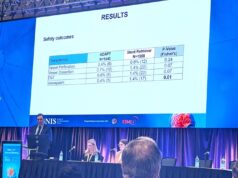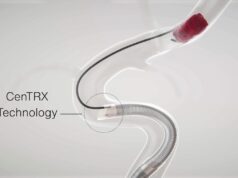
Imperative Care has today announced late-breaking data from the Imperative trial evaluating aspiration thrombectomy via the Zoom system in stroke patients with M2 occlusions, presented at the Society of NeuroInterventional Surgery (SNIS) annual meeting (14–18 July, Nashville, USA).
Clinical data from a subanalysis of 65 patients with M2 occlusions enrolled in the Imperative trial were disclosed by Justin Mascitelli (UTHealth San Antonio, San Antonio, USA). The subanalysis reported a median age of 69 years, with a median presenting National Institutes of Health stroke scale (NIHSS) score of 13.
The results demonstrated an 88% core lab-adjudicated rate of final modified thrombolysis in cerebral infarction (mTICI) ≥2b reperfusion, as well as “excellent” clinical outcomes at 90 days, with a 56% rate of modified Rankin scale (mRS) scores of 0–1 and a 62% rate of mRS 0–2. The analysis also found a symptomatic intracranial haemorrhage (sICH) rate of 1.5% (n=1), an all-cause mortality rate of 4.6% (n=3), and an all-ICH rate of 18.5% (n=12).
“These data suggest that excellent safety and clinical outcomes can be achieved with aspiration thrombectomy in patients with M2 occlusions,” said Mascitelli. “The clinical community has important questions around the impact of treating MeVO [medium-vessel occlusion] and DVO [distal-vessel occlusion] patients given the ESCAPE-MeVO and DISTAL trial data evaluating stent retrievers and the best medical-based treatments. It’s critical that this topic be further explored with evidence-generating studies on aspiration specifically, which I believe will undoubtedly move the field—and, most importantly, patient outcomes—forward.”
“The Imperative trial demonstrated excellent reperfusion and safety results in patients with M2 vessel occlusions treated with the Zoom system,” added Ariel Sutton, general manager of Imperative Care Stroke. “Engineered as a complete solution, the Zoom stroke system helps physicians perform their procedures swiftly, efficiently, and with confidence. We have amassed a robust portfolio of clinical data on Zoom and its benefits, and look forward to further advancing research by funding the first randomised study of aspiration thrombectomy in M2 occlusions.”
Imperative is set to fund an investigator-initiated, randomised clinical trial comparing continuous dual aspiration thrombectomy with the Zoom stroke system plus best medical treatment versus best medical treatment alone for M2 occlusions in stroke patients. According to the company, this will be the first trial to look at an aspiration approach specifically for M2 occlusions with the goal of evaluating the potential impact of aspiration thrombectomy in these patients.
In addition, Imperative recently announced a new partnership with Proximie—a global health technology platform attempting to digitise operating rooms—with the aim of driving the development of a robotic surgical system to treat ischaemic stroke. The partnership will integrate Imperative’s robot-assisted Telos platform, which is currently in development and has been designed to enable both onsite and remote aspiration thrombectomy procedures, alongside Proximie’s software development kit (SDK), which allows audio, video and telemetry data to be shared with the physicians performing the procedure.










